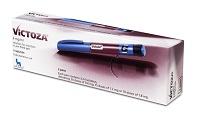 Move over, Jardiance.
Move over, Jardiance.
On Friday, Novo Nordisk announced that its own med, GLP-1 treatment Victoza, significantly reduced the combined incidence of heart attack, stroke and cardiovascular death in high-risk Type 2 diabetes patients--news that'll help it compete with the Eli Lilly ($LLY) and Boehringer Ingelheim treatment, which accomplished the feat last year.
Full results from Novo's LEADER trial--which tracked more than 9,000 patients over a period of up to 5 years--won't be unveiled until this June's American Diabetes Association annual meeting. But in the meantime, Novo is "very excited" about the top-line data, company R&D chief Mads Krogsgaard Thomsen said in a statement.
And it has good reason to be. Last August, SGLT2 contender Jardiance became the first diabetes med to cut down on CV risk, a status some analysts said could shake up the diabetes landscape in a big way. And there was plenty of pressure on Victoza to do the same: In September, Leerink Partners analyst Seamus Fernandez predicted "moderately negative impact to overall GLP-1 sales" if Victoza couldn't pull it off.
 |
| Novo's Mads Krogsgaard Thomsen |
Now, though, Novo is hoping it can capitalize on some of the sales success industry-watchers have predicted for Jardiance and its SGLT2 brethren. And as Thomsen said last year on an earnings call, because Victoza and Jardiance work differently--GLP-1 drugs stimulate insulin production, whereas SGLT2s help patients excrete blood sugar through urine--any positive CV effects for his company's therapy could be for a different--and potentially better--reason.
"My view is that it's more interesting to have an agent that, if it can interfere in the vessel wall pathology due to … [the] maladies that are ongoing in the Type 2 diabetic body, then that would be a long-term investment for the patient because you would get the legacy or the memory effect of the drug that once was used, unlike a diuretic which works when it's given and stops working after it's given the last time," he said.
Victoza could certainly use the boost; in the fourth quarter of 2015, it suffered from an adjustment to rebates, which triggered larger-than-expected discounts in previous periods. The Danish drugmaker also lowered its long-term forecast for profits with that earnings announcement, predicting expenses would rise along with sales.
- read the release
Special Report: Top 10 best-selling diabetes drugs of 2013